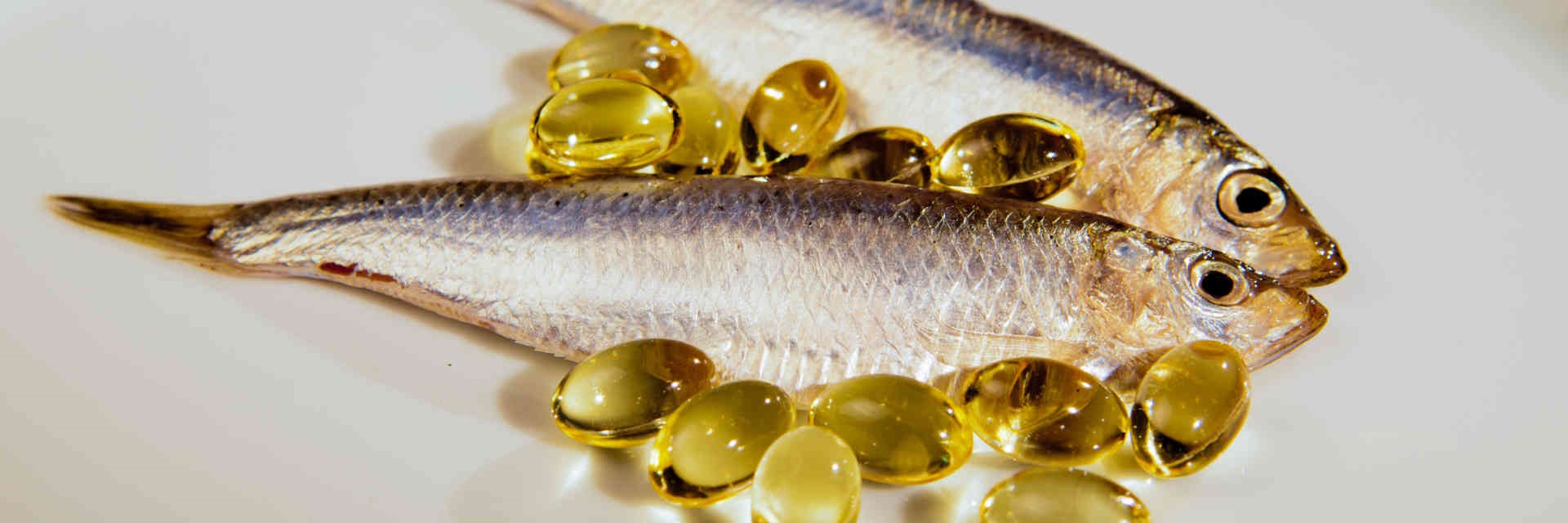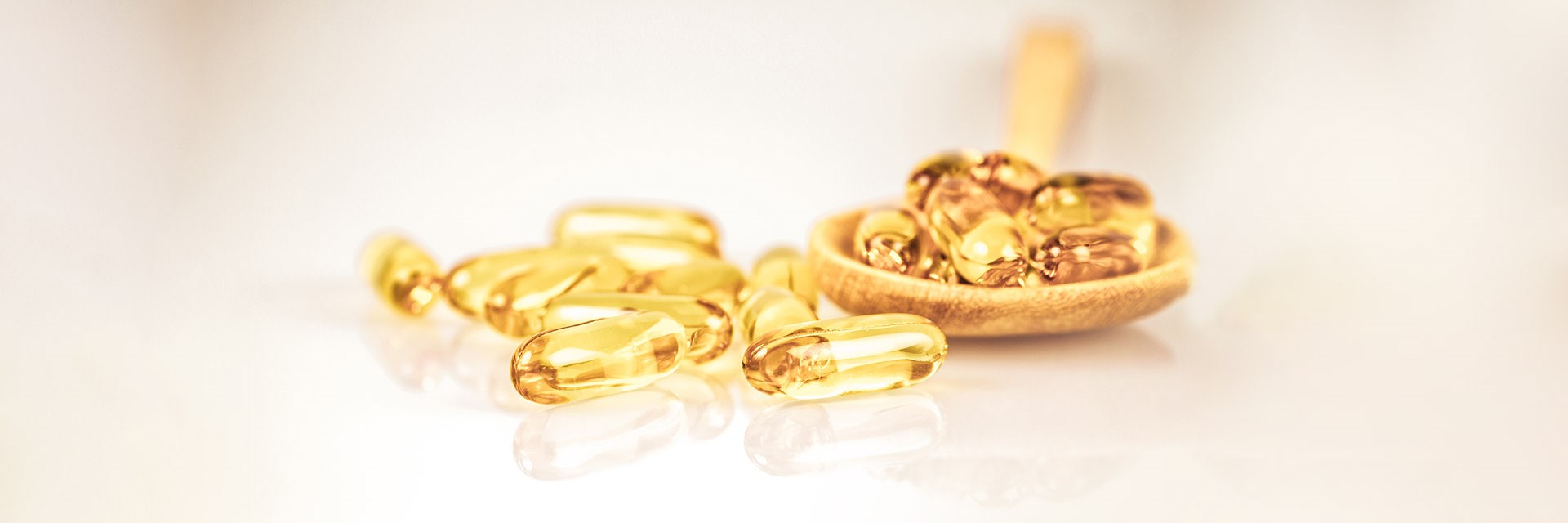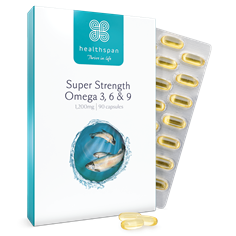Omega 3 Supplements
Omega 3 Supplements
Omega 3 fish oil is one of the most popular supplements, thanks to its wide-ranging benefits – including supporting eye, brain and heart health. Most omega 3 is sourced from fish, but vegetarian and vegan alternatives are available. Omega 3 supplements are important for anyone who doesn't eat the recommended two portions of oily fish a week.
Healthspan customer reviews
Omega 3 Guides



What is Omega 3 fish oil?
The health benefits of fish oil come from its omega 3 content. Omega 3s are a type of polyunsaturated fatty acid, which exist in short- and long-chain forms, and have different effects in the body depending on their length.
The shortest, alpha-linoelic acid (ALA), is described as 'essential'. This means our body cannot make it, so it must be obtained through diet. However, the long-chain DHA and EPA omega 3s are the most beneficial to our health. A small amount of ALA can be converted into EPA and DHA in the body if conditions are right, but as the process is highly inefficient, many experts still regard DHA and EPA as 'essential' and needing to come from the diet.
As most people do not consume enough oily fish, finding the right omega 3 supplement is an important way to look after your health. Quality, purity and ensuring that the fish oil has been sustainably sourced are all important, and will help your body obtain the maximum benefit from the supplement.
Healthspan omega 3 supplements are accredited by 'Friend of the Sea', an international, not-for-profit organisation committed to looking after our oceans. To be approved, products must demonstrate sustainable practices that respect fish stocks, the marine food chain and the sea bed.
For vegans and vegetarians, Healthspan's Veg-Omega 3 is sustainably sourced from natural algae.
What are omega 3 supplements good for?
Omega 3 fatty acids have health benefits even when we're in the womb; in particular, supporting the normal development of the brain and eyes. They continue to play an important role throughout our lives, with a number of studies also looking into their effect on heart health.
Brain health
DHA plays an important structural role within brain cell membranes, improving their fluidity so that messages are passed on more rapidly from one cell to another. This makes DHA vital for the development of normal brain function during foetal development and while breastfeeding.
Eye health
Similarly, maternal DHA intake is also important for the normal development of the eyes, both in unborn babies as well as breastfed infants. This is because DHA is concentrated in the light-sensitive cells at the back of a developing baby's eyes, where it makes up around 50 per cent of the weight of each retina.
Heart health
EPA and DHA also play an important part in heart health, contributing to the normal function of the heart and the maintenance of normal blood pressure. At a daily intake of 2g DHA and EPA, DHA also contributes to the maintenance of normal blood triglyceride levels – having too much triglyceride in your blood can increase the risk of heart disease.
Who should consider taking omega 3 supplements?
A number of surveys – including the National Diet and Nutrition Survey – have confirmed that our fish consumption remains well below the recommended two portions a week (one of which should be oily).
The desirable minimum intake of omega 3 fatty acids is 450mg – although some experts recommend 1g of EPA and DHA a day (equating to 2-3 medium servings of oily fish). In reality, average UK intakes are 1g of EPA and DHA a week.
Vegetarians and vegans are particularly likely to be deficient in omega 3. Although there are other dietary sources of omega 3, many provide it in the ALA form, which is not effectively converted into the superior DHA and EPA forms.
Fortunately, vegan omega 3 supplements – particularly those using algae sources, where fish get their omega 3 from in the first place – can effectively correct any shortfall.
Signs of deficiency
To date, few studies have investigated the symptoms of omega 3 deficiency. In addition, because many of omega 3's benefits occur internally, it can be difficult to know if you are deficient. However, skin irritation and dryness, changes to your hair's texture, and dry eyes are some possible external symptoms.
Omega 3 during pregnancy
Omega 3 is important during pregnancy for a baby's brain, eyes and nervous system.
Pregnant women may choose to take a supplement to avoid the risk of marine pollution that can come with eating fish. For this reason, official guidelines advise that girls and women of child-bearing age should eat no more than two portions of oily fish a week.
As well as choosing an omega 3 supplement specifically for pregnancy, women who are pregnant should also avoid cod liver oil supplements, as they contain high amounts of vitamin A (which can be harmful to the baby.)
Read more about what to eat during pregnancy.
Omega 3 for kids
One of the important roles DHA plays is to keep brain cell membranes flexible, which is important for brain function.
As a result, good fish oil intake can play an important role in school performance.
Find out more more about the benefits of omega 3 for kids.
The different types of omega 3 supplements
Omega 3 supplements come in a variety of forms, including liquids, capsules and gummies. Choosing the right one for you depends on your diet, lifestyle and nutritional requirements.
The desirable minimum intake of long-chain omega fatty acids is 450mg per day (equivalent to eating 2-3 medium servings of oily fish per week), but the European Food Safety Authority has confirmed that long-term intakes of supplements providing up to 5g of EPA and DHA per day (or up to 1g DHA alone per day) do not raise any safety concerns.
However, if you take any blood-thinning medication or have a clotting disorder, you should always speak to your GP before taking a fish oil supplement.
Omega 3 capsules
Omega 3 is traditionally taken in capsule form, for ease of dosage and to avoid the fishy taste. Healthspan's range contains several different strengths of fish oil capsule, as well as vegan options.
High Strength Omega 3 1,000mg
Provides 120mg DHA and 170mg EPA per capsule – sustainably sourced and highly purified to ensure all pollutants, saturated fat and cholesterol have been filtered out.
Super Strength Omega 3 1,200mg
Healthspan's highly concentrated fish oil. A daily dose of two capsules can provide 480mg DHA and 720mg EPA to support brain, heart and eye health. Every drop of fish oil is double-distilled to ensure maximum purity.
Opti-Omega 3
Designed for optimum absorption in the body, Opti-Omega 3 is made with gastro-resistant shells to reduce acid reflux and fishy burps. A daily dose of two capsules delivers 640mg DHA and 640mg EPA, provided in triglyceride form, which is better absorbed by the body.
For athletes: Elite Sport Essentials
Three high-quality nutritional supplements (multivitamin, probiotic and omega 3), recommended for all athletes. Each capsule contains sustainably sourced fish oil, highly distilled for unmatched purity, providing 850mg total omega 3 fatty acids (including 230mg DHA and 520mg EPA).
Omega 3 supplements in alternative forms
For those who don't like swallowing capsules, omega 3 is also available in other forms – including gummies and liquids – which deliver all the same health benefits.
Omega 3 gummies: Möller's Omega 3 Jelly Fish Strawberry Gummies
DHA, EPA and added vitamin D3 in easy-to-chew gummies, with no added sugar and a delicious strawberry flavour (and no fishy taste). A daily dose of two jellies provides 280mg DHA, 56mg EPA and 10 micrograms of vitamin D3 to support brain and vision, growing bones and immunity.
Omega 3 liquid: Möller's Omega 3 Cod Liver Oil
Provides the purest cod liver oil, sourced from sustainable fisheries in the pristine waters of northern Norway. Each teaspoon contains 1.2g omega fatty acids, including 500mg DHA and 400mg EPA, and vitamins A, D and E to provide further support for joint health and the immune system.
The liquid is the winner of a superior taste award, with a delicious lemon flavour and no fishy taste.
Omega 3 for vegans
Since omega 3 is mainly found in fish, if you're following a plant-based diet you should take extra care to make sure you're getting enough. Supplements can help.
Veg-Omega 3 1,000mg
High-quality omega 3 from natural microflora. The ground-breaking ingredient in Veg-Omega 3 is non-GMO, sustainable and provides 340mg DHA and 170mg EPA in each capsule.
A batch-tested, Informed Sport-approved version is also available for competing athletes.
Choosing the best omega 3 supplement for you
For more information on choosing the right fish oil supplement, please feel free to get in touch with one of our trained UK-based product advisors, who will be happy to help.







 FREE UK DELIVERY - HURRY, ENDS TODAY!
FREE UK DELIVERY - HURRY, ENDS TODAY!
